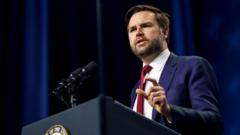US-China tensions deepen as tariffs escalate and diplomatic exchanges spark social media backlash.
Beijing Labels Vance 'Ignorant' Over Controversial Comments

Beijing Labels Vance 'Ignorant' Over Controversial Comments
China rebukes US VP Vance after remarks about borrowing from "Chinese peasants" stir outrage.
China has criticized U.S. Vice President JD Vance for his recent comments regarding America borrowing money from "Chinese peasants," calling his remarks "ignorant and impolite." The statement came from foreign ministry spokesperson Lin Jian during a press conference on Tuesday, where he expressed disappointment at Vance's words, which have already ignited a storm on Chinese social media.
Vance made the contentious remark during a Fox News interview on Thursday while defending the tariffs imposed by former President Donald Trump, which have intensified friction between the two leading global economies. "We borrow money from Chinese peasants to buy the things those Chinese peasants manufacture," Vance stated.
In a related move, Trump issued an ultimatum to China, demanding the removal of a 34% counter-tariff by Tuesday, or face an escalated 50% tax on U.S. imports of Chinese goods. Should the president follow through on this threat, U.S. businesses could confront an exorbitant total tariff of 104%, compounded by previous tariffs announced earlier in the year.
Beijing responded firmly to the escalating trade tensions, asserting that it would "fight to the end" against what it termed "bullying" from the U.S. government. Lin again emphasized that China's stance on economic and trade relations with the U.S. has been clearly communicated.
Vance's comments prompted an intense reaction among Chinese netizens, with some users demanding he be prohibited from entering China. "As a key figure in the U.S. government, it is really shameful for Vance to say such things," commented a user on Weibo, while others noted the irony of Vance’s criticisms in contrast to his memoir, "Hillbilly Elegy," which reflects on his roots in rural America.
Supporters of Trump have long claimed that his tariff strategy will rejuvenate the American economy and safeguard employments. However, numerous economists have issued warnings, positing that these measures may severely disrupt global supply chains, inflate consumer prices, and create significant risks of recession in both the U.S. and the broader international economy.
The ongoing U.S.-China trade war has already impacted financial markets, with reports highlighting substantial declines in Asian stocks following the recent tariff disputes. Both nations remain locked in increasingly hostile negotiations, with neither side showing signs of compromise.
Vance made the contentious remark during a Fox News interview on Thursday while defending the tariffs imposed by former President Donald Trump, which have intensified friction between the two leading global economies. "We borrow money from Chinese peasants to buy the things those Chinese peasants manufacture," Vance stated.
In a related move, Trump issued an ultimatum to China, demanding the removal of a 34% counter-tariff by Tuesday, or face an escalated 50% tax on U.S. imports of Chinese goods. Should the president follow through on this threat, U.S. businesses could confront an exorbitant total tariff of 104%, compounded by previous tariffs announced earlier in the year.
Beijing responded firmly to the escalating trade tensions, asserting that it would "fight to the end" against what it termed "bullying" from the U.S. government. Lin again emphasized that China's stance on economic and trade relations with the U.S. has been clearly communicated.
Vance's comments prompted an intense reaction among Chinese netizens, with some users demanding he be prohibited from entering China. "As a key figure in the U.S. government, it is really shameful for Vance to say such things," commented a user on Weibo, while others noted the irony of Vance’s criticisms in contrast to his memoir, "Hillbilly Elegy," which reflects on his roots in rural America.
Supporters of Trump have long claimed that his tariff strategy will rejuvenate the American economy and safeguard employments. However, numerous economists have issued warnings, positing that these measures may severely disrupt global supply chains, inflate consumer prices, and create significant risks of recession in both the U.S. and the broader international economy.
The ongoing U.S.-China trade war has already impacted financial markets, with reports highlighting substantial declines in Asian stocks following the recent tariff disputes. Both nations remain locked in increasingly hostile negotiations, with neither side showing signs of compromise.





















